LOST 023 - Dude, Where's My Cuckoo's Nest?
Unpacking the TV show LOST — Season 2: Episodes 17-19
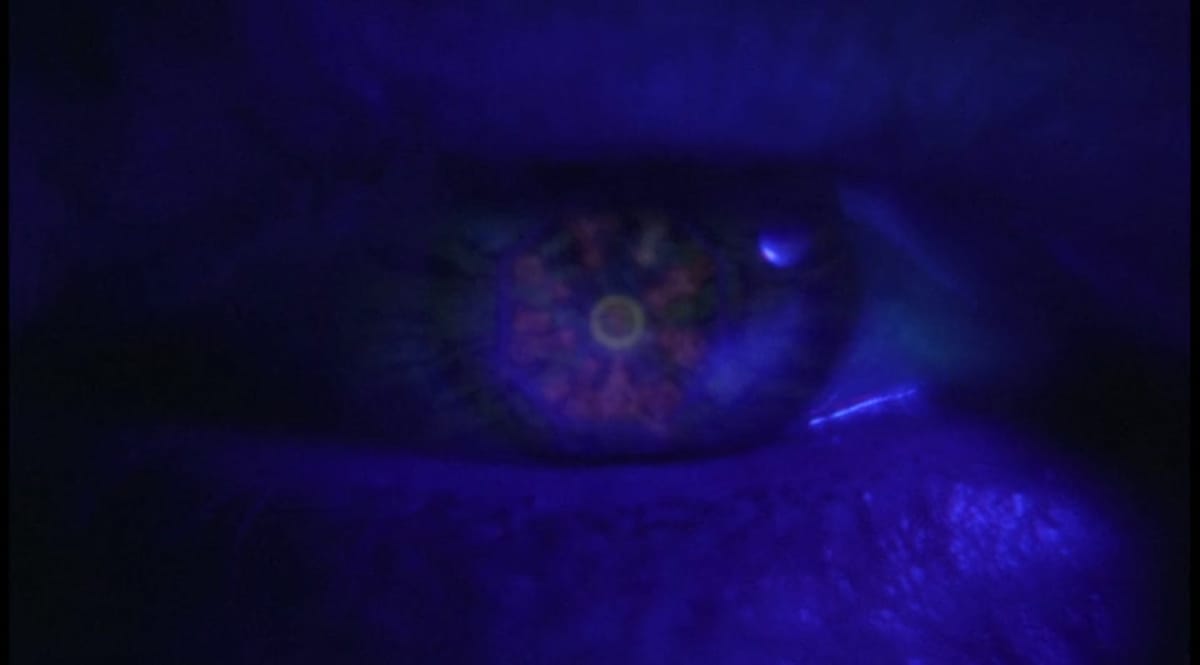
Mama mia! The weeks have gone by, as weeks tend to do, and it’s time once again. The only thing worse than talking about LOST is not talking about LOST.
It’s-a Mario time!
Previously, on LOST: Oceanic Flight 815, she-a no fly so good. Now all of its survivors (that we know about anyway) are on the jungle island of mystery, pushed and pulled by forces they don’t understand, watched and stalked and harassed by people already living there, one of whom they (correctly) suspect they may have captured. He claims his name is Henry. They’re holding him in the bunker they appropriated from the Scotsman. Oh yeah, there’s a bunker and a Scotsman. If you’re going to push a button every 108 minutes to save the world, you need a bunker to put that button in. Oh yeah, there’s a button. It—look, you know what? I could do this for hours.
Let’s-a go!
O B S E R V A T I O N
Something really interesting on rewatch: the important episodes are easier to spot when you know where the story’s heading. On first watch, it’s the surface drama that pops, and every mystery introduced holds relatively equal weight. But upon rewatch, certain mysteries, moments, and questions carry far more significance, because you know how they’ll develop, while others, which may have initially seemed vital, actually turn out to be the smallest of potatoes.
For example, while Season 1 was for me the more enjoyable experience upon first watch, it is Season 2—which upon first glance struck me as muddled and narratively stuck—that feels upon rewatch the real start of the main story. It’s striking just how much the story snaps into place as soon as “Henry Gale” appears in the narrative. The three episodes on offer today include one (“Lockdown”) which seemed on first watch to be an “important” episode (and it kind of is), and two others (“Dave” and “S.O.S.”) which are generally seen as relative water-treading throwaways, but which I actually believe contain hugely important information.
As a result, I’m going to try to speed-run the episode recaps.
I suspect we’re going to have a lot to talk about in “Belief.”
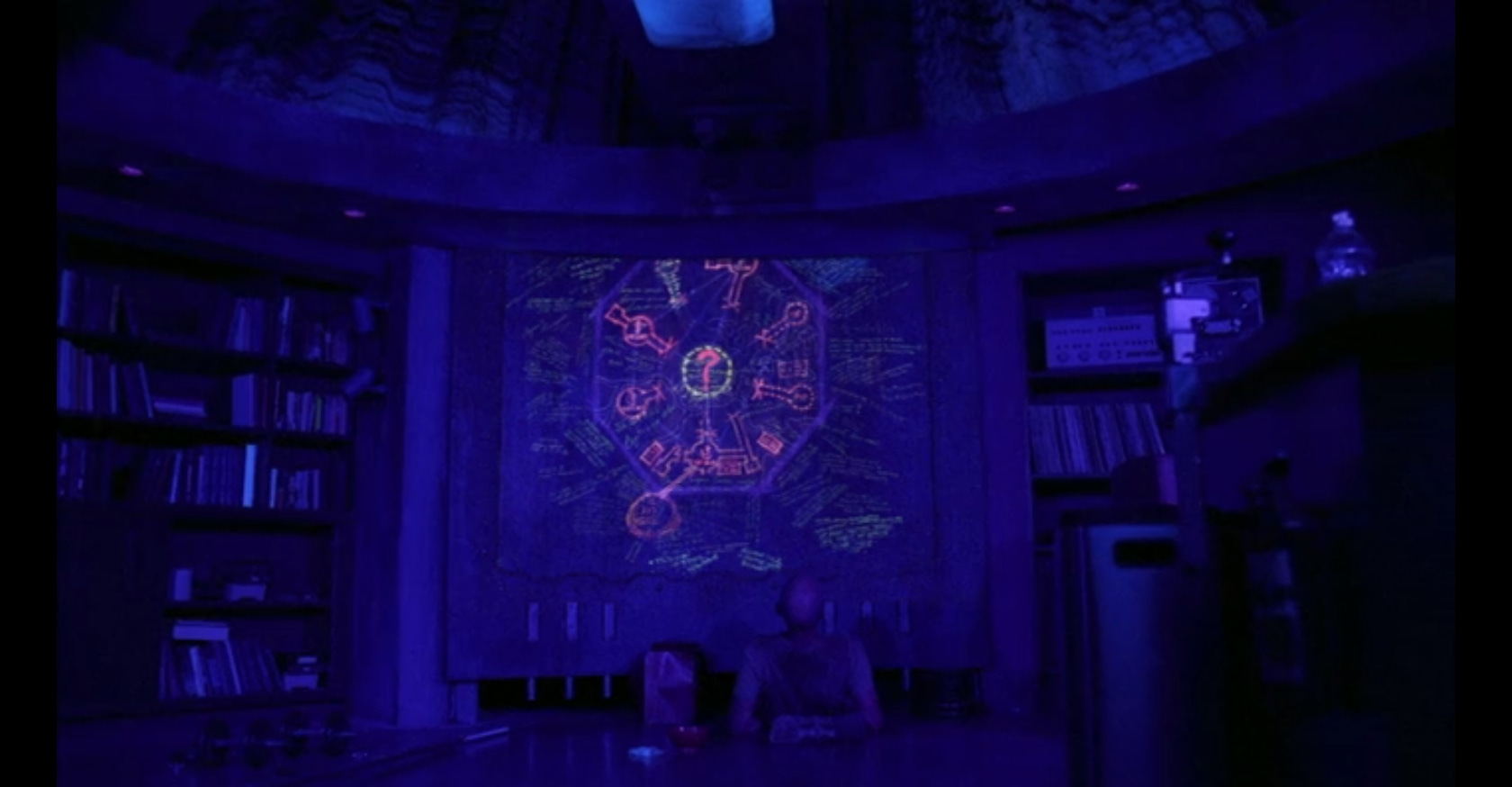
Episode 17: LOCKDOWN (Locke): In the A-story, “Henry” continues to work his manipulative magic on Locke, playing on his insecurities and his desire to be the group leader (one might even say his belief that he is destined to be group leader)—but this is interrupted when the bunker suddenly locks Locke down. Bomb blast doors descend, and Locke is trapped on the wrong side of the computer.
Desperate to push the button, Locke frees “Henry” to help him wedge the blast door open, then rather unwisely tries to slide underneath before he’s really tested the structural integrity of his jerry-rigged brace, and oopsie! it comes partway down on his legs, leaving Locke dependent upon his prisoner to crawl through the ductwork and push the button before the universe goes kablooey. It’s all very dramatic and before “Henry” saves the day (which he does) the lights cut out and black lights go on and Locke sees, for a tantalizingly short few seconds, a strange map of what appear to be interconnected island bunkers dabbed onto the wall in otherwise invisible luminescent paint, and … whew. My friends, this was the sort of high-quality mystery worldbuilding shit that kept me coming back for more.
All this drama is intercut with a pretty good Locke-back, in which Locke gets scammed once again by his shitheel con man of a father, and his obsessive need for affirmation ruins his chance at happiness with his long-suffering fiancée Helen, who decides she’d rather stop suffering long with a guy who can’t let go of his bullshit. This is pretty good Season 2 flashback stuff because Katey Sagal and Kevin Tighe are fantastic actors, and because this demonstration of how desperate Locke is for belonging really underscores the weaknesses that men like “Henry” can exploit (to say nothing of what godlike entities with bodies of smoke and electricity can do).
In the B plot, Sawyer is hustling Hurley and Kate in poker for fruit rations when Jack Of Course comes by and does the Matt Damon “immediately knows what everyone’s hand is at a glance” thing that annoys anybody who knows anything about poker. Anyway, Jack eventually cardsharps the card sharp, hustling Sawyer to get the medicine he horded1. “Why didn’t you play for the guns?” Sawyer snarls. “When I need the guns, I’ll get the guns,” Jack smirks, and I’m not gonna lie, and I say this as not the hugest Jack fan, it’s not a bad Jack moment.
Anyway, Henry has earned Locke’s eternal trust … which is immediately broken when Sayid and company return from their excursion. They followed “Henry’s” map, and found “Henry’s” balloon, and the grave of “Henry’s” wife … but Sayid didn’t get to be an army interrogator by being a trusting soul, so he dug that grave up and discovered the body of the real Henry Gale2.
John Locke’s faith is misplaced yet again.
And “Henry” is so screwed.
End of Episode 17.
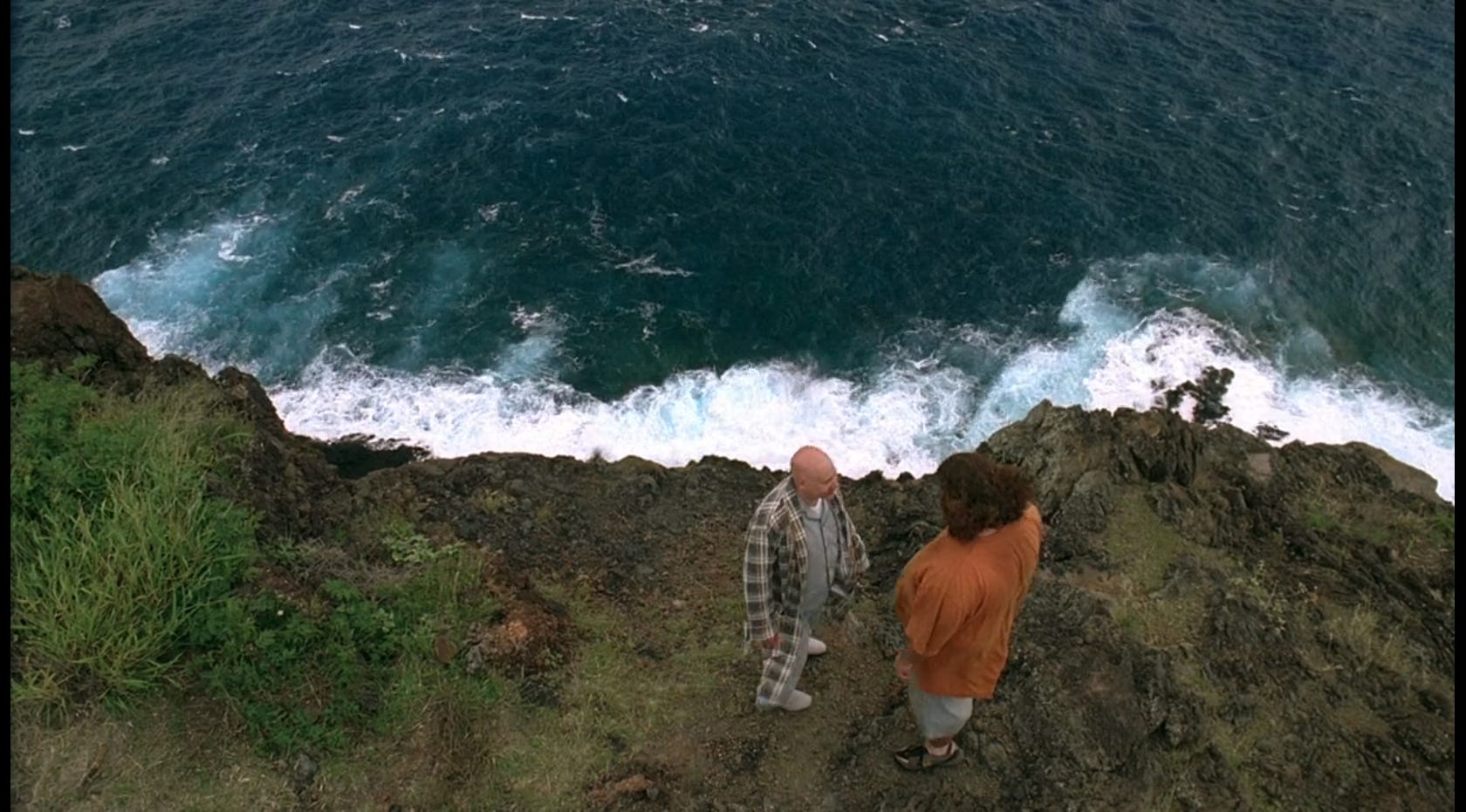
Episode 18: DAVE (Hurley): This episode has some Hurley stuff I dislike (the food-hording plot for the fat character and the idea that fatness is punishment is lazy at best in my opinion; at least they mostly abandon it after this) but a lot of Hurley stuff I love (everything else). In one of the episodes that incorporates flashbacks and island story most successfully, we learn that Hurley was institutionalized because of survivor’s guilt that he attributes (inaccurately) to his weight, and he eats to punish himself—a self-harming desire that he has externalized in the figure of “Dave,” who’s a sort of Randle Patrick McMurphy type, but imaginary, and more into donuts than basketball. Eventually, Hurley rejects Dave when Dave tries to get him to escape out a window, which we learn is the event that led to his eventual recovery.
In island-time, Hurley’s very cute budding romance with clinical psychologist and tail-section survivor Libby is interrupted by a reappearance of Dave, who has attended a recent bout of food hording and binge-eating enabled by the massive stashes of food in the Swan bunker. Libby convinces Hurley to get rid of his stash, and they’re just about to smooch when—shit!—they’re interrupted by commotion: there has been a parachute drop of replacement Dharma food; massive pallets of all kinds of stuff. The Gang Loots A Food Drop. Hurley runs away, shook.
Dave convinces a spiraling Hurley that he’s still in the institution, his dissociative mind dreaming up all of this admittedly rather unbelievable stuff, and tries to convince him that the way out is to jump from a very high place3. Dave being Dave, he casts Libby’s affections for Hurley in the “unbelievable” camp due to Hurley being a fat man, but he’s happily wrong about that, and Libby talks Hurley down from the literal ledge, and they smooch, and it’s very nice.
In the B story, “Henry,” now exposed as an Other, tells Locke that “god can’t see this island any better than the rest of the world” (which he may believe is true), and that he never pushed the button and the whole button thing is a scam (totally untrue). This sends Locke into his own spiral of lost faith, and “Henry,” who is every bit the liar that Rousseau claimed he was, smiles an evil little smile. In interrogation with Sayid, Henry also makes reference to “him,” a leader that he’s afraid of (partly true), and reveals that Tom Friendly, who has until now seemed to be the Others’ leader, is a mere lacky (entirely true).
In a rarity, the episode stinger occurs in the flashback, and it’s a doozy. Libby was in the institution with Hurley … as a patient. Woah!
End of Episode 18.
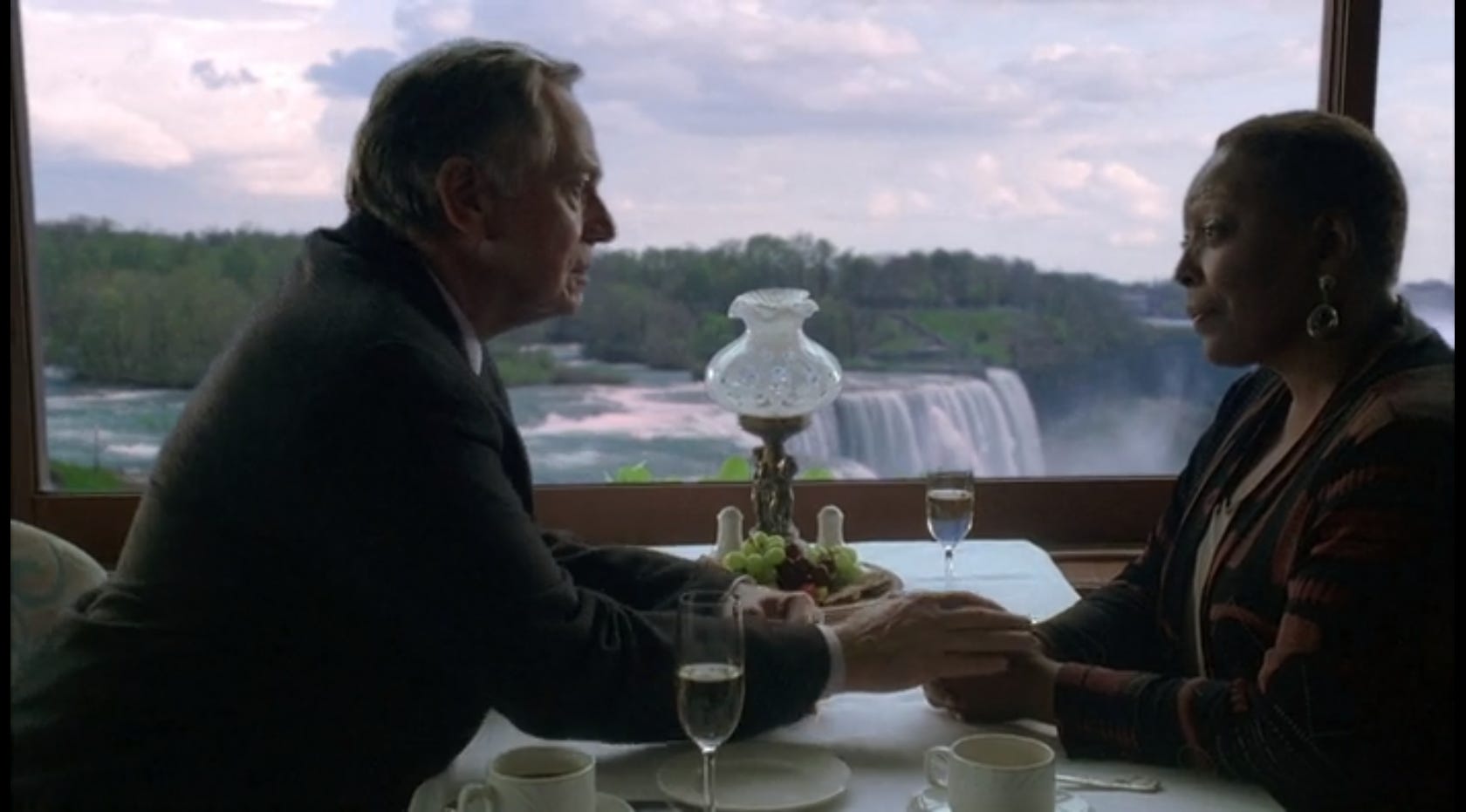
Episode 19: S.O.S. (Rose & Bernard) Our one Rose & Bernard episode is a sweet one. Turns out these two are newlyweds who only met recently, but fell hard for each other, and married quickly in part because time is not on their side: Rose has cancer, and it’s terminal. We also learn in flashback that whenever Bernard isn’t hiding in the jungle scared for his life, he’s sort of a tetchy guy who wants to take charge and fix every problem, which is why they were in Australia in the first place—Bernard took Rose to a faith healer, who claims to live on a place of strange spiritual energy. He also claims he can’t do anything for Rose, and offers a refund, but Rose, who just wants to live her very few remaining days in peace, tells him to keep the money so she can tell Bernard she’s fixed, so he will stop annoyingly trying to fix her unfixable problem.
Here on the island, he’s back at it again. He’s alarmed that nobody is trying anymore to be rescued, and recruits Jin and some no-names (and Neil Frogurt, mentioned but unseen) to build a giant S.O.S. sign on the beach. He stops when Rose reveals that the island has healed her cancer4. Bernard passes this character test and believes his wife. He stops trying to fix what doesn't need fixing and agrees that the two of them will accept the gift they've been given: they will live on this island for the rest of their days. They will diminish, and leave the main plot, and go into the east, and remain Rose & Bernard.
On the other hand, you have Jack. Jack’s going out to the uncrossable line to try to trade Henry to the Others for Walt. (Henry: “They’ll never give you Walt.”) He invites Kate along, and she’s flattered, so he makes sure to tell her it’s because he noticed they didn’t really want her. God, Jack. Anyway, after some boring-to-me attempts at romantic tension, they arrive. Jack yells ineffectively for a long time, which sort of describes early-season Jack well5.
Eventually somebody comes out of the underbrush and collapses, unconscious.
It’s Michael.
They released him without demanding “Henry” back.
Huh.
End of Episode 19.
B E L I E F
We observed as quickly as possible. I want to believe!
1) The mystery map: A great example of how a rewatch will change your opinion of what is important and what isn’t. This map felt like the Rosetta Stone when it first aired, but the truth is that while its revelation is a great dramatic moment, it isn’t much of anything—which we might have guessed when Locke became obsessed with it. We’ll learn that Desmond’s predecessor Kelvin (last seen teaching Sayid the ways of torture, and more on that soon) added to it, as did his predecessor. The “?” at the map’s center will soon be revealed as the station that exists to observe and report on the Swan. The scribblings are partly in English, and partly in Latin. You can find diagrams translating everything online.
I believe the map represents a conversation between the Swan attendants; the sort of surreptitious thing that people who are relatively imprisoned and vaguely aware they are being observed, and also are going more than a little unhinged over the years, might engage in to make sense of their surroundings. I think some of them have been Dharma operatives and at least one must have been a Jacobian (that’s what the Latin would indicate).
As for what the map says? It’s mostly guesses made by idiots, full of sound and fury.
2) The food drop, meanwhile, is probably the most significant clue we’ve yet seen, because it proves that the island is detectable and reachable by somebody. We’ll later learn that it’s a functionary department of the off-island Dharma Initiative, a warehouse whose location Ben Linus knows. (In fact, this is the very last thing we’ll ever learn.)
I believe this teaches us that Dharma is still being operated in the “real” world to some degree, and that the Linus faction controls it, and has managed to spoof itself as on-island Dharma to off-island Dharma, even though (spoilers) Linus murdered almost everyone in the Dharma Initiative years and years ago.
The drop also demonstrates the reason for the lockdown: to prevent the Swan attendants from seeing the manner of delivery6. Though, interestingly, nobody else on the island saw the manner of delivery. It's almost as if it dropped down out of the sky from ... nowhere.
This gets us into questions of where the hell this island is.
3) “God can’t see this island.” Guys? Where are we?
That’s what Charlie asked.
I’d like to answer the question now.
Well, Charlie … you’re in a place that has a massive source of electromagnetic and spiritual energy at its center. It can sometimes be reached by parachute drop, and sometimes can capture an airliner flying at 40,000 feet or an oceangoing hot air balloon, and sometimes its reachable by submarine, and sometimes it is in North Africa, and sometimes it is in the South Pacific, and when you go there you sometimes go to one time relative to the island, and sometimes you go to a different time, and the whole thing can be calculated and predicted, so the people who possess the knowledge of that calculation possess a pretty significant power relative to other island-interested groups, is what I believe.
This suggests an orbit to me. A geosynchronous and a chronosyronous orbit.
And I believe that if somebody did something dramatic to the power source at the center of the island, then the island might change its orbit, which would make the island seem to “move” geographically relative to somebody observing it from the outside, or seem to move through time relative to the people who had been synced to its timeline prior to that dramatic event, and which might mean that new calculations would need to be made before it would be findable again, and that the change would have to be reversed if people jumping through time on the island wanted to stop jumping through time.
The island seems to be bit of matter that revolves around the earth and sometimes within the earth, and across its chronological timeline—which, because of its unique pan-dimensional qualities, doesn’t interact with the physical matter of earth, which means that sometimes it is soaring high in the sky relative to the earth, and sometimes it is in the ocean depths, and yet it never loses sight of the sun.
And I believe that sometimes when you are on the island and it is orbiting past the 1950s while way up in the air, and you are Hurley and Sayid, you might pick up some Lawrence Welk on the radio that is bouncing off the stratosphere, because the stratosphere in the 1950s is where and when you are, relative to the earth.
And I believe that if your name is Ricardo and you are imprisoned on a slave ship in the 1800s and that ship passes near the island during more ancient times, then you might find yourself there in the year … oh let’s say 100 CE.
And I think where the island comes near to the surface of the earth, it creates pockets of special energy, which (because the island itself has healing qualities) just might heal people if they come to those places at the right time, in … oh let’s say the Australian outback.
That’s what I believe, and it will be fun to point out all the little “unanswered mysteries” over the course of series, which I believe are not mysteries at all, or unanswered, but which are themselves the answers to Charlie’s very important question.
That’s the flip I would like to make in people’s minds. In a way it’s really the point of my doing this: stop thinking about the mysteries as mysteries: start thinking about them as the answers.
4) Libby: It’s time to talk about something I haven’t brought up much, which I actually think represents the most important “main story” aspect of the flashbacks: the fact that all these people have been interconnected for all their lives in a variety of different ways, of which they are (and will remain) mostly unaware.
For example, I mentioned that Desmond’s predecessor in Swan station was the guy we already met who taught Sayid to torture, but I didn’t remark on the fact that he was accompanied by Kate’s stepfather. And Sawyer met Jack’s dad. And speaking of Jack’s dad (spoilers), Jack will soon learn that Claire is his half-sister. His father had a secret family out in Australia. Isn’t that neat?
In these episodes we saw Locke doing a home inspection for Sayid’s lost love Nadia, and we’ll eventually discover (spoilers!) that Locke’s dad is the real Sawyer that our Sawyer is seeking, to whom he wrote that letter he carries around. There are dozens and dozens of these connections right now, some of which become plot-relevant and some of which don’t.
And Libby was in the institution with Hurley. This won’t be plot-relevant for reasons that will soon become obvious, but I do think it’s one of those mysteries that is actually an answer.
It’s why I think that Libby Smith is some faction of “Other,” and probably a very complicated kind. We’ll learn there’s a faction that exists mostly to preserve reality, led by a woman named Eloise Hawking. They’re the ones who possess the knowledge of where/when the island is, by the way. Isn’t that great for reality and anybody who wants to see it preserved?
And we’ll learn that there is another oppositional faction, led by a man named Charles Widmore, who Ben Linus is opposed to and terrified of. Widmore’s looking for the island with all his considerable resources, which is how we know that he doesn’t control the knowledge of where/when the island is.
So I believe that, for reasons of their own, which probably involve opposing the Widmore faction, and probably also involve making sure the Swan button keeps getting pushed (and probably—Latin, remember—at least once successfully placing one of their own recruits in Swan), the Hawking faction is working with Linus, even if they don’t trust him (at least not if they are smart). And as proof I submit to you that the Dharma supply drops are still arriving.
And we know that Jacob interacts with the Hawking faction. As we’ll see, at least once he’s come to somebody hospitalized, cured them, and sent them on a special mission.
And we’ll eventually learn that both factions are very very interested in a man named Desmond Hume, who seems to be some sort of Constant of reality itself.
Widmore was instrumental in getting Desmond to the island.
So was Libby Smith.
Let’s keep an eye on that.
5) “I never pushed your button.” As we know, “Henry Gale” is Ben Linus, leader of an on-island Others faction. He’s been groomed by The Adversary since childhood, and because of this he knows many things that other people don’t know, and is adept at using that knowledge to maintain power.
We will eventually learn that he got himself captured on purpose. The reason he gives is mostly true, and it’s the one I gave last time: he’s getting close to Jack, the man who can cure his inoperable tumor, the better to manipulate him.
But we don’t see him working on Jack here. We see him working on Locke.
To recap some relevant things we’ve observed earlier: The Adversary’s great desire is to destroy The Island, and, with it, reality. One of the many rules acting as an obstacle to that goal is that The Adversary is forbidden from directly killing those Jacob has called. He can trick them into killing each other or themselves, though. (Which is why I believe that, on the island at least, Dave is a manifestation not of Hurley’s psyche, but rather The Adversary. I even suspect Dave might have been The Adversary off-island, but maybe that’s something to unpack later.)
We will also learn that The Adversary has been grooming Ben Linus as a weapon, by increasing his bitterness toward Jacob.
Here’s what I believe. I believe that Ben is on an island that he knows heals people. It’s an island he knows is governed by the will of a distant entity named Jacob, whose favor Ben has come to desire over anything else. Ben pretends to be in communication with Jacob, and uses knowledge gained from The Adversary in order to back that claim up … but over all these long years, during which he’s surely been receiving a steady diet of narratives of his own huge importance, and of other truths, half-truths, and lies from The Adversary, Ben has never met Jacob, and he takes this as a sign of rejection and disfavor.
And now Ben’s received the ultimate rejection, the ultimate sign of Jacob’s disfavor: a deadly illness, in a place that cures deadly illnesses.
As a result, he feels as abandoned as Locke, and as embittered as The Adversary.
Ben has been making sure that the button gets pushed (or at least has not been preventing it), and in return he’s been getting regular drops of supplies from the Hawking faction. But now, he’s ready to enact The Adversary’s plan, which involves not pushing the button.
Ben is happy to try to get Jack to fix him. But I believe that’s Plan B.
Plan A is convincing somebody to not push it, in order to end reality and destroy Jacob. And he’s decided that Locke is the best mark.
I suspect that in only a handful of episodes, we’re going to see this plan succeed.
Literally.
L O S T
Next Time: One Shot Two Shot
Thank you for reading The Reframe. This post is public so feel free to share it.
A.R. Moxon is the author of The Revisionaries, which is available in most of the usual places, and some of the unusual places, and co-writer of Sugar Maple, a musical fiction podcast from Osiris Media which goes in your ears. He was walking through the jungle just the other night; he heard about a rumble and thought it was a fight.
The writers seem to realize that, despite recent efforts to restore Sawyer’s status as a bad dude, Josh Holloway is just too damn charming to hate; they walked that heel turn back almost immediately. ↩
The truth of what happened to Henry Gale is one of the great unexplored stories of the show and would be worth exploring in a Season 7. I have some ideas for that season. Damon Lindelof, call me. ↩
Interesting sidenote: to convince Hurley to jump, Dave jumps first himself, and when he does he gives Desmond’s catchphrase: “see you in another life.” I don’t have any grand unifying theory of this. Just a fun detail. ↩
There’s a nice moment where Rose also reveals to Locke that she knows he too has been healed. ↩
I’ll be nicer to Jack in later seasons, but for now I think the fact that his overwhelming urge to take control and fix unfixable situations makes him a dick is kind of the understated point, and I think it’s neat that Bernard within this one episode goes through the same journey that Jack goes through over the entire series. ↩
Since (spoilers) the button is real, and really needs to be pushed, this seems like a design flaw in the lockdown. We’ll have to assume that the lockdown protocols account for it, but figuring out how would be pure speculation; we’re never told them because they don’t matter to the story. I have a theory that … nah. I’ll tell you next time. ↩

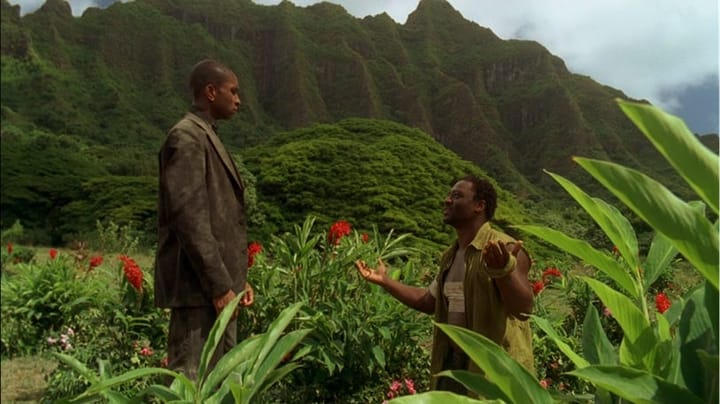
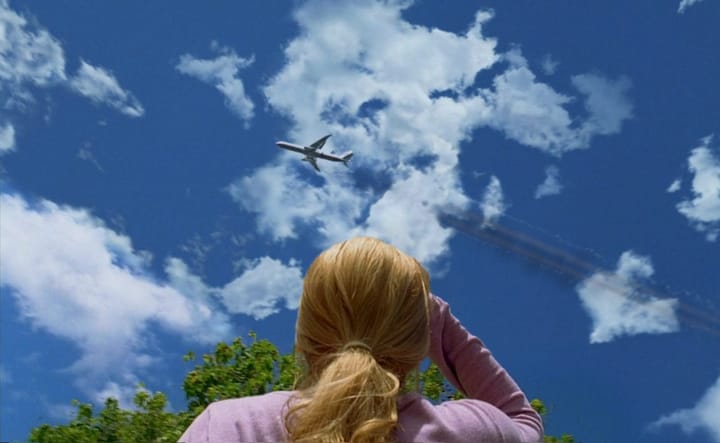
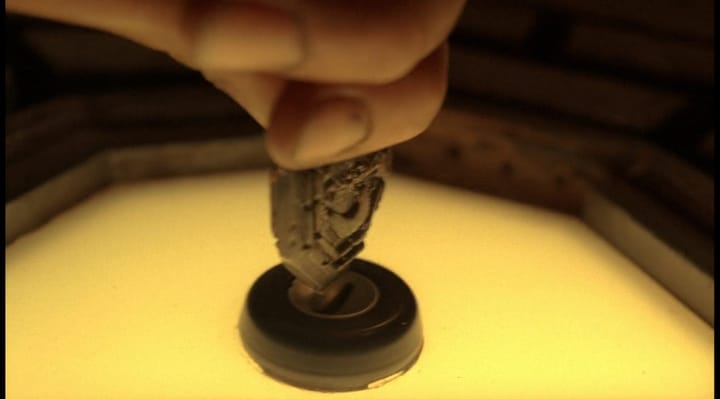
Comments ()